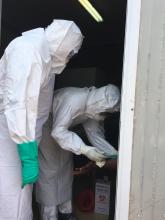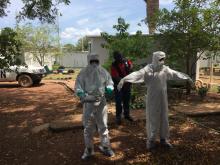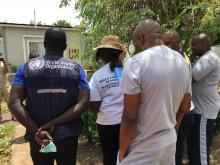The Ministry of Health of South Sudan successfully conducts its first ever diagnostic test for Ebola
Juba 15 October, 2018 – South Sudan has successfully conducted its first ever laboratory test for Ebola using the emergency management and laboratory infrastructure developed with support from WHO as part of emergency preparedness.
The Joint External Evaluation (JEE) for South Sudan which was conducted in 2017, made a number of recommendations to fill the gaps in laboratory capacity and ability to fulfil the core competencies of the International Health Regulations 2005. WHO with support from DFID, South Sudan Humanitarian Fund, USAID, and the European Union Humanitarian Aid (ECHO) and in collaboration with Centers for Disease Control and Prevention (CDC), has since been supporting the country to address these gaps, particularly in creating the capacity required to diagnose priority diseases in-country. Earlier this year 20 Ministry of Health (MoH) staff from the National and State levels underwent an intensive training on laboratory biosafety and EVD preparedness. This included training on the use of GeneXpert to safely test for the Zaire strain of Ebola at the National Public Health Laboratory.
On 12 October 2018, the United Nations Mission in South Sudan (UNMISS) in Rumbek alerted WHO of a suspected case of Ebola virus disease (EVD) involving one of its staff members who had recently returned from the Democratic Republic of Congo (DRC). A rapid response team of experts from WHO and MoH was immediately deployed to investigate the alert. Blood samples from the patient were tested for Ebola Zaire at the National Public Health Laboratory in Juba using the GeneXpert technology and the results were provided within 6 hours of taking the sample in Rumbek; which is a first time in the country. In parallel, the samples were sent to the Uganda Virus Research Institute for differential diagnosis.
According to Dr Olushayo Olu, the World Health Organization Representative in South Sudan, testing of suspected EVD cases with support of optimal laboratory capacities at national level is a critical component of national readiness capacities for EVD response. He noted that the GeneXpert requires minimal training, limited laboratory infrastructure, procurement of only reagent kits, no cold-storage and can run on a generator. Dr Olu commended the efforts of MOH South Sudan on this important milestone. He acknowledged support from donors who have strengthened the laboratory system in South Sudan for EVD and other diseases of public health importance. Furthermore, he pledged ongoing WHO support to establish additional capacity to diagnose the other strains in the country.
Although South Sudan has not reported a confirmed case of EVD, MoH has been on very high alert and enhanced preparedness and operational readiness since the beginning of the EVD outbreak in DRC in August 2018. Furthermore, following the recent elevation by WHO of the risk assessment of EVD spread in the region from “high” to “very high, South Sudan and its neighbouring countries are working to develop and test operational readiness for a potential EVD response.
The next step is to expand the range of testing and train staff to perform conventional PCR diagnosis of Ebola and other viral haemorrhagic fevers, with equipment that will arrive in country next month. Staff from the laboratory are travelling to the Uganda Virus Research Institute next week for this purpose. WHO is also working closely with MoH and other partners to coordinate and build capacities in surveillance, case management, contact tracing, infection prevention and control, points of entry screening and control, and exploring avenues for the use of experimental vaccines and treatments in South Sudan.






